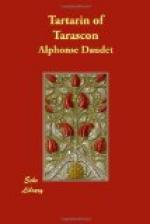The first essential point to be decided was whether the lion had been killed on civil or military territory. In the first case Tartarin would come before a civil tribunal, in the second he would be tried by court-martial: at the word court-martial Tartarin imagined himself lying shot at the foot of the ramparts, or crouching in the depths of a dungeon... A major difficulty was that the delimitation of these two areas was extremely vague, but at last, after months of consultation, intrigue, and vigils in the sun outside the offices of the Arab Bureau, it was established that on the one hand the lion was, when killed, on military ground, but on the other hand that Tartarin when he fired the fatal shot was in civilian territory. The affair was therefore a civil matter, and Tartarin was freed on the payment of an indemnity of two thousand five hundred francs, not including costs.
How was this to be paid? The little money left after the prince’s defection had long since gone on legal documents and judicial absinthe. The unfortunate lion killer was now reduced to selling off his armament rifle by rifle. He sold the daggers, the knives and coshes. A grocer bought the preserved food, a chemist what was left of the medicine chest. Even the boots went, with the bivouac tent, into the hands of a merchant of bric-a-brac. Once everything had been paid, Tartarin was left with little but the lion-skin and the camel. The lion-skin he packed up carefully and despatched to Tarascon, to the address of the brave Commandant Bravida. As for the camel, he counted on it to get him back to Algiers: not by riding it, but by selling it to raise the fare for the stage-coach, which was at least better than camel-back. Sadly the camel proved a difficult market, and no one offered to buy it at any price.
Tartarin was determined to get back to Algiers, even if it meant walking. He longed to see once more Baia’s blue corslet, his house, his fountain and to rest on the white tiles of his his little cloister while he awaited money to be sent from France. In these circumstances the camel did not desert him. This strange animal had developed an inexplicable affection for its master, and seeing him set out from Orleansville it followed him faithfully, regulating its pace to his and not quitting him by as much as a footstep.
At first Tartarin found it touching. This fidelity, this unshakable devotion seemed wholly admirable; besides which the beast was no trouble and was able to find its own food. However, after a few days Tartarin grew tired of having perpetually at his heels this melancholy companion, who reminded him of all his misadventures. He began to be irritated. He took a dislike to its air of sadness to its hump and its haughty bearing. In he end he became so exasperated with it that his only wish was to be rid of it; but the camel would not be dismissed. Tartarin tried to lose it, but the camel always found him. He tried running away, but the camel could run faster. He shouted “Clear off!” and threw stones: the camel stopped and regarded him with a mournful expression, then after a few moments it resumed its pace and caught up with him. Tartarin had to resign himself to its company.




